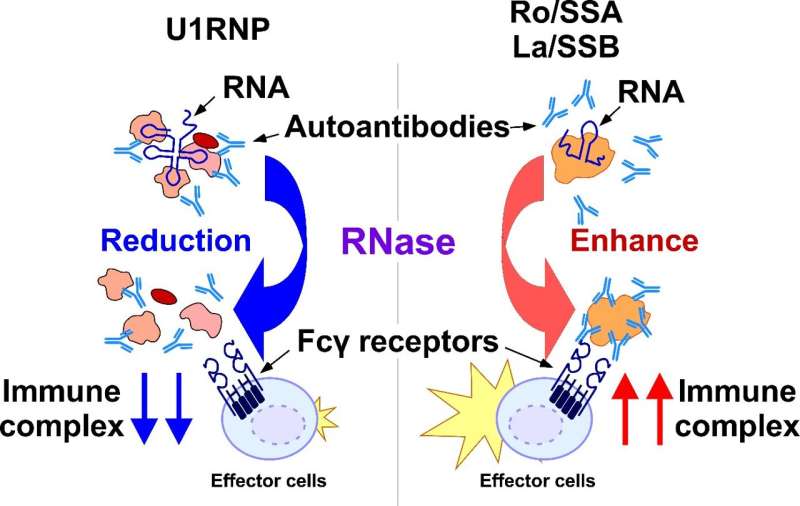This article has been reviewed according to Science X's editorial process and policies. Editors have highlighted the following attributes while ensuring the content's credibility:
fact-checked
peer-reviewed publication
trusted source
proofread
The double face of RNase as a treatment for systemic autoimmune diseases

Systemic autoimmune diseases are characterized by inflammation of multiple organs and can have devastating consequences for patients. There is a dire need for treatments against these diseases. RNase treatments seem promising in some clinical trials but not all. Researchers from Japan have uncovered the reasons for this variability.
In a study published in the Journal of Clinical Investigation Insight (JCI Insight), researchers from Osaka University have provided new insights into the opposite effects of RNase treatment—enhancing and weakening immune activation.
The immune system defends the body. Essentially, it produces antibodies that bind to targets called antigens. Antibody–antigen complexes, also known as immune complexes, can then be eliminated.
Autoimmune diseases happen when the immune system produces antibodies that recognize its own body components. Some autoimmune diseases affect one organ, such as pancreatic cells in type I diabetes, but systemic autoimmune diseases involve more. In some systemic autoimmune diseases, antibodies target nuclear proteins bound to RNA molecules. The resulting immune complexes stimulate the production of factors that activate the immune response, such as type I interferons. Because RNases can destroy RNA molecules, these RNA-containing immune complexes can be destabilized by RNases.
Therefore, clinical trials have tested RNase treatment as a potential therapy for systemic autoimmune diseases. The results are promising, but they also reveal a paradox—RNase treatments can stimulate the autoimmune response. To understand this phenomenon, the researchers investigated the effects of RNases on the immune response.
"We hypothesized that the efficacy of RNase-based treatments depends on the localization of the RNA-binding site," says Ryota Naito, lead author of the study. "Indeed, in some antigens, the sites binding to antibodies and those binding to RNA are very close. Removing RNAs might allow more antibodies to bind to the antigens and, consequently, stimulate the immune response."
The team tested the effects of RNase treatment on the production of type I interferons induced by immune complexes isolated from patients with systemic autoimmune diseases. "We observed opposite effects of RNase treatment on the production of type I interferons, and the differences were directly related to the composition of the immune complexes," says Hisashi Arase, senior author.
The researchers also confirmed the increased binding of antibodies to antigens in immune complexes that stimulated type I interferon production in the presence of RNase. Thus, RNase likely unmasked the binding sites for the antibodies when removing RNA from antigens. As a result, more immune complexes formed and stimulated autoimmunity.
This study provides insights into the mechanisms involved in systemic autoimmune diseases. It will most likely lead to better treatments for patients with these conditions.
More information: Ryota Naito et al, Positive and negative regulation of the Fcγ receptor-stimulatory activity of RNA-containing immune complexes by RNase, JCI Insight (2023). DOI: 10.1172/jci.insight.167799




















